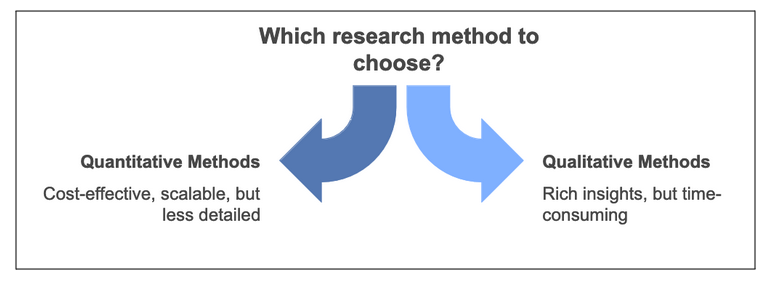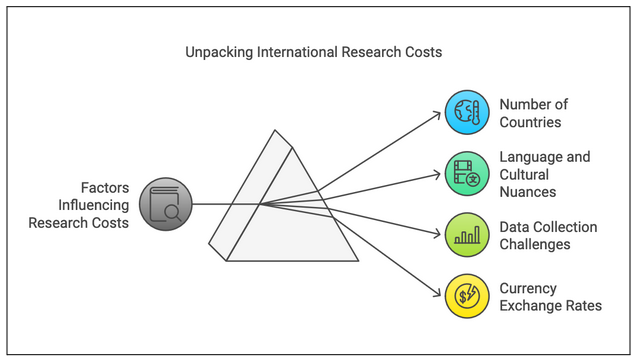Market research is the backbone of any successful business strategy. It provides invaluable insights into consumer behavior, market trends, and the competitors. By understanding these factors, businesses can make informed decisions that drive growth and profitability.
In recent years, we've had the privilege of assisting over 100+ businesses with their market research needs. Our expertise spans diverse industries, from agriculture to life sciences and marketing to countless others.
This article aims to shed light on the costs associated with market research. We'll also explore the factors that influence pricing and provide a comprehensive overview to help you budget effectively. Whether you're a small startup or a large corporation, understanding the financial implications of market research is crucial for making strategic decisions.
So, let us get started:
How Much Does Market Research Cost?
The cost of a custom market research can range from $10000 to $200,000 or more, depending on the complexity and scope of the project. Smaller research projects with fewer resources and a narrower focus may cost less. However, in-depth, comprehensive market research studies involving extensive data collection, analysis, and reporting can be more expensive.
While these figures provide a general idea, the actual cost of your market research project will depend on several factors. In the next section, we'll look into some of the major factors that influence the pricing of market research.
Factors That Impact The Cost of a Market Research
Below are some of the major factors that impact the cost of a market research project based on our experience of working on various market studies and helping brands like Illumina, Zeiss, Shell, DYWIDAG, and more.
1. Scope and Depth of the Research
The scope and depth of your research project are primary determinants of cost. A broad, in-depth study that covers multiple markets, demographics, and behaviors will naturally be more expensive than a narrow, focused study.
Key factors influencing cost within this category include:
- Research Objectives: Clearly defined, specific objectives help streamline the research process and reduce costs.
- Target Audience: A larger, more diverse target audience requires a larger sample size and more complex data collection methods.
- Level of Detail: A high level of detail, such as in-depth interviews or focus groups, can increase costs.
- Industry Complexity: Complex industries with numerous variables and nuances may require more extensive research.
2. Data Collection Methods
The method used to collect data significantly impacts the cost of a market research project. Different methods have varying levels of complexity, time commitment, and resource requirements.
Quantitative methods, such as surveys and online polls, are often more cost-effective as they can be automated and scaled to large sample sizes. However, qualitative methods, like in-depth interviews and focus groups, can provide richer insights but are more time-consuming and labor-intensive.

Important Note: The choice of data collection method should align with your research objectives and budget constraints.
3. Sample Size
The sample size, or the number of respondents included in the study, directly impacts the cost. A larger sample size generally leads to more accurate and reliable results but also increases costs. The required sample size depends on factors like the desired level of precision, the target population's variability, and the statistical methods used.
For instance, a small-scale survey of 100 respondents might be sufficient for a local business, while a nationwide study may require a sample size of thousands.
4. Geographic Scope
The geographic scope of your research can significantly impact the cost. Conducting research in a single country is generally less expensive than a multinational study. 
Factors influencing cost within this category include:
- Number of Countries: Researching multiple countries requires additional resources for data collection, translation, and cultural adaptation.
- Language and Cultural Nuances: Understanding cultural differences and language barriers can add complexity and cost to the research process.
- Data Collection Challenges: Accessing reliable data and respondents in different countries can be challenging, especially in emerging markets.
- Currency Exchange Rates: Fluctuating exchange rates can impact the overall cost of the research, particularly for international studies.
5. Data Analysis and Reporting
The complexity of data analysis and the level of detail required in the final report can significantly impact the cost of a market research project.
Advanced statistical analysis techniques and sophisticated data visualization tools can be more expensive to implement. Additionally, the time required to analyze and interpret data, as well as to create a comprehensive report, contributes to the overall cost.
The depth of analysis and the level of customization in the final report are key factors influencing the cost within this category.

![How Much Does Market Research Cost? [2025 Updated]](https://ausqeflbrqwwyqaxnwab.supabase.co/storage/v1/object/public/blogs/public/market-cost-featured%20(1).jpg?t=2025-01-15T14%3A58%3A28.702Z)





